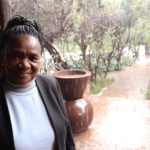© Copyright Bhekisisa Centre for Health Journalism | Privacy Policy | Terms and Conditions | PAIA Manual
Home Search
Africa - search results
If you're not happy with the results, please do another search
From Moshi to Moscow: How a girl from the slopes of Kilimanjaro became Tanzania’s...
In 1969, Esther Mwaikambo became Tanzania’s first female doctor. Today, she is arguably also the country’s most famous. She tells Sean Christie how public healthcare in Africa has changed — and what she wishes for the future.
#TeamBhekisisa | From 2013 to 2023: Here’s what’s in a day’s work for Bhekisisa...
Mia Malan founded Bhekisisa in 2013. Since then the centre’s staff has grown from 3 to 20 full and part-time employees. Here’s what she’s had to do to make this happen.
Dirty air & diabetes: Scientists say there’s a link
A seven-year study across 12 000 people in two Indian cities shows that breathing in dirty city air for as little as one month can raise blood sugar levels. After a year of this, people have a higher chance of getting type 2 diabetes.
Making the case: Why poor mental health flags the need for HIV testing
To help South Africa wipe out HIV by 2030, the country focuses on getting people who have a big chance of getting or spreading HIV access to testing and treatment. Researchers say that people with serious mental illnesses should be added to the list of these key populations in South Africa. Learn more.
[WATCH] Why a hotter Earth makes dirty air more dangerous
Doctors have told Khehla Mahlangu and Jeremiah Maseko that their lungs are no good. They’ve lived and worked in Secunda in Mpumalanga for many years, where factories have dirtied the air. And now climate change is worsening things.
Yes or no? Here’s what SA says sexual consent means
From kissing to final base, people have to say yes before you can go on. We asked people in South Africa what consent means to them, and what influences their decisions.
Over a million SAs have used the HIV prevention pill
More than a million public healthcare users in South Africa had started to use the HIV prevention pill by the end of May, with over half doing so in the past two years, health department data shows. But what must we do to make the pill — and a two-monthly HIV prevention injection — easier to get?
Should nurses be allowed to hand out psychiatric drugs?
People with HIV have a big chance of battling with mental health problems. At the moment though, only doctors can prescribe psychiatric medicines. Could getting nurses to do this too help people with HIV to stay on their treatment, and so get infection rates down? Mia Malan finds out from a doctor who’s lived through HIV with his patients for the past 20 years.
#BhekisisaDiaries: Why Zano Kunene writes rugby stories
From the pitch to print, health reporter Zano Kunene takes you on the journey of how his passion for sports led to writing on sports-related brain injuries.
The waiting game: Could SA’s poor policies be behind our organ donation crisis?
In South Africa, the demand for donor organs far outstrips the supply — not because people aren’t signing up for donation, but rather because there aren’t policies in place to manage the transplant chain. Spain, though, has managed to fix the problem in their country. Can we learn from them?
The fine line between wrong and almost right — and how that plays out...
What should journalists do when presidents say the wrong thing — report the story or bury it? A medical doctor, editor, Rhodes Scholar and New York City’s health commissioner during COVID take a deep dive.
A spritz in time could save nine: Should schools have anti-overdose drugs at hand?
To help keep kids safe from drug overdoses, lawmakers in the US state of Colorado say schools can have an anti-overdose medicine in their emergency kit — and are making it available cheaply or even for free. But not all schools are signing up. Here’s why.
What HIV does to your brain — and how ARVs halt that
Left untreated, an HIV infection can cause inflammation in someone’s brain and lead to mental health problems. But antiretrovirals can stop it from happening. Mia Malan finds out how it works in this Health Beat interview.
Will the Earth’s changing climate make TB spread faster?
The world is far behind its TB targets. Hoping to reduce TB deaths by 75% by 2025, world leaders have only managed to bring it down by 5.6% so far. Climate change, however, can derail these targets even more. The changing climate increases poverty, overcrowding, and malnutrition, the primary drivers of TB.
[WATCH] Yvette Raphael’s incredible journey of two decades with HIV
South Africa’s HIV plan says nurses, not just doctors, should be able to prescribe antidepressants. HIV-positive people struggle with their mental health more than those without the virus. But is this plan enough to help them stick to their daily pill regimens? This activist says no. Watch her story to find out why.
If your dying baby’s organs could save an adult’s life, would you donate them?
A dying baby’s kidneys could save an adult’s life. But it’s a tough decision — and one few grieving parents are willing to make. Would you?




![[WATCH] Why a hotter Earth makes dirty air more dangerous](https://bhekisisa.org/wp-content/uploads/2023/10/Coal-Station-150x150.jpg)









![[WATCH] Yvette Raphael’s incredible journey of two decades with HIV](https://bhekisisa.org/wp-content/uploads/2023/10/6E2A3947-2-150x150.jpg)
